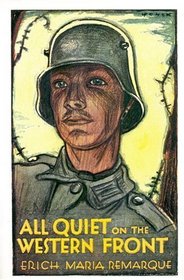Erich Maria Remarque published his landmark novel All Quiet on the Western Front in 1928, based on his experience in the Imperial German Army during World War I. Remarque was a German-born novelist and All Quiet was an international bestseller which was adapted to film several times. His anti-war themes led to his condemnation by Nazi propaganda minister Joseph Goebbels as "unpatriotic" but he was able to use his literary success and fame to relocate to Switzerland as a refugee, and to the United States, where he became a naturalized citizen.
All Quiet on the Western Front describes the German soldiers' extreme physical and mental trauma during the war as well as the detachment from civilian life felt by many upon returning home from the war. It is billed by some as "the greatest war novel of all time". The novel is told through the eyes of 19-year-old Paul Bäumer who is thrust into the bloody trenches of WWI along with several of his school mates. The novel details the horrors of the war including the infestations of rats and lice in the trenches and the terrible toll it took on the young men fighting for no apparent reason. Paul describes some of these horrors:
"We see men living with their skulls blown open; we see soldiers run with their two feet cut off, they stagger on the splintered stumps into the next shell-hole; a corporal crawls a mile and half on his hands dragging his smashed knee after him; another goes to the dressing-station and over his clasped hands bulge his intestines; we see men without mouths, without jaws, without faces; we find one man who has held the artery of his arm in his teeth for two hours in order not to bleed to death."
The novel also discusses the meaninglessness of war and questions why wars get started. Who benefits from war? Why would a French blacksmith want to be fighting a German farmer? As the war progresses, Paul and his friends face more and more perils and ultimately pay the ultimate price. This is probably the most honored and read antiwar novel and its message remains very powerful and unforgettable. I would recommend this one to everybody.
All Quiet on the Western Front describes the German soldiers' extreme physical and mental trauma during the war as well as the detachment from civilian life felt by many upon returning home from the war. It is billed by some as "the greatest war novel of all time". The novel is told through the eyes of 19-year-old Paul Bäumer who is thrust into the bloody trenches of WWI along with several of his school mates. The novel details the horrors of the war including the infestations of rats and lice in the trenches and the terrible toll it took on the young men fighting for no apparent reason. Paul describes some of these horrors:
"We see men living with their skulls blown open; we see soldiers run with their two feet cut off, they stagger on the splintered stumps into the next shell-hole; a corporal crawls a mile and half on his hands dragging his smashed knee after him; another goes to the dressing-station and over his clasped hands bulge his intestines; we see men without mouths, without jaws, without faces; we find one man who has held the artery of his arm in his teeth for two hours in order not to bleed to death."
The novel also discusses the meaninglessness of war and questions why wars get started. Who benefits from war? Why would a French blacksmith want to be fighting a German farmer? As the war progresses, Paul and his friends face more and more perils and ultimately pay the ultimate price. This is probably the most honored and read antiwar novel and its message remains very powerful and unforgettable. I would recommend this one to everybody.




